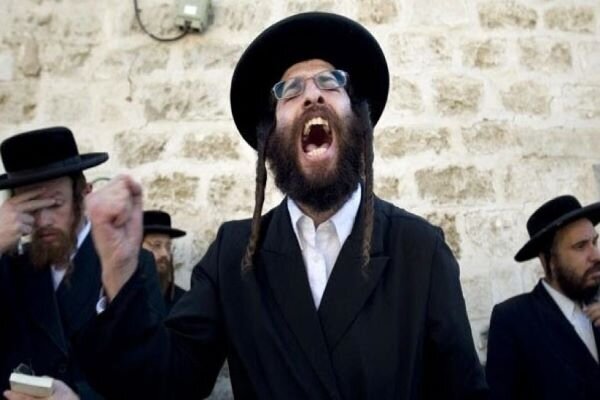Major Challenge for Zionists: Who Are the Haredim and What Do They Demand?

MEHR News Agency, International Desk: Amid the multifaceted political adn military crises engulfing the Zionist regime in recent years, the Haredi community-ultra-Orthodox Jews-has once again emerged as a key player in its political and social landscape. This group, known for thier strict adherence to Torah traditions, forms a meaningful part of Israel’s religious and cultural fabric and directly influences cabinet policies through their demands. the recent massive protests in Jerusalem dubbed the “March of Millions” vividly illustrate tensions between two main pillars within Israeli society: religious traditionalism and state secularism. This event unfolded while Israel remains embroiled in the Gaza war and facing internal strife. The widespread presence of Haredim on the streets signals not merely a religious protest but a deeper clash over identity, social justice, and the legitimacy of a secular government.
Examining Recent Haredi Protests
Jerusalem recently witnessed one of its largest-ever religious demonstrations. According to Israeli media reports,more than 200,000 Haredi followers gathered downtown to oppose the Supreme Court’s decision to revoke military service exemptions for yeshiva students.Named by some outlets as the “March of Millions,” this protest paralyzed public transportation and shut down major city routes.
The exhibition began with orderly religious conduct but rapidly took on political dimensions.Chants such as “The Torah is Our Shield” and “Religious Study Is True Service” reverberated throughout the crowd. Participants wore traditional black attire and carried signs with religious themes, presenting their presence not solely as civil disobedience but as an expression of spiritual resistance.
religious leaders emphasized in speeches that canceling student exemptions constituted an “assault on Jewish faith foundations” that no authority could justify. Scattered clashes broke out between police forces and some protesters; tragically, a 15-year-old boy died after falling from height during these events-a development that intensified media attention considerably. Following this incident, parts of Israeli public opinion viewed these demonstrations as evidence of disregard for law enforcement among Haredim; meanwhile protesters described their actions as “sacrifices made for faith.”
The political impact was substantial: religio-political parties representing Haredim-including Shas and United Torah Judaism-used this mobilization to pressure Netanyahu’s cabinet toward reinstating military exemptions and restoring funding for religious schools. On the other hand, secular parties and centrist movements labeled these demands unjust privileges or shirking civic duty amid heavy fighting by Israel’s army in Gaza.Consequently, these protests represented more than just a religious event; they revealed a deepening legitimacy crisis within government institutions alongside widening rifts between Israel’s religious communities.
Who Are The Haredim And What Do They Demand?
The Haredim are an extreme branch within Orthodox Judaism that originated in 19th-century Eastern Europe. The term derives from Hebrew meaning “those who fear god,” reflecting an outlook viewing any contact with modernity as threatening pure religionality.First intellectual leaders like Rabbi Moshe Sofer opposed Jewish Enlightenment (Haskalah) movements strongly while advocating solely returning to authentic Torah traditions preserving religious identity.After European Jewish communities collapsed or emigrated many adherents resettled across various closed-off neighborhoods throughout Mandatory Palestine including Tel Aviv.
The current estimated population stands around 1.3 million people-or roughly 13-14% percent-of Israel’s total populace.Socially speaking,Haredi men mostly dedicate time exclusively studying at yeshivas (religious seminaries) rather than entering workforce.Women usually manage household finances though generally earn below-average incomes compared nationally.
Theologically,their beliefs adhere strictly literal interpretations both Torahl-Talmudic laws seeing existence rooted firmly upon observing all 613 commandments (mitzvot).Continuous study is considered an essential communal duty whose sustainability underpins not military prowess but spiritual endurance vital for Israel’s survival.Many thus regard democracy or Zionism themselves secular constructs incompatible with divine sovereignty principles upheld via tradition.
Their three primary governmental demands include consistent financial support approximating one billion shekels annually towards religion-based schools (yeshivot),strict observance honoring Shabbat prohibiting public activity on Saturdays,and enforcing complete gender segregation forbidding mixed environments socially or educationally.These claims frame preservation efforts against cultural encroachment rather than special privileges.
A central dispute arises from mandatory conscription.The state initially exempted small groups temporarily since its founding year (1948) out respect toward religion,resulting over decades into permanent deferments benefiting approximately thirteen thousand individuals annually.Rapid population growth creates pressure rendering exemption increasingly controversial.Haredim contend army life conflicts fundamentally with sacred laws: mixed-gender settings,secular norms,Sabbath infractions,and distance from holy districts render service halachically unfeasible.Secular Israelis see such waivers unjustifiably burdening others instead possibly endangering national security obligations equitably shared.[/p]
Conclusion
In June 2024,the Israeli Supreme Court revoked these historic exemptions while halting budgets allocated figure education,reigniting sharp political turmoil.Haredi factions subsequently withdrew coalition support becoming key drivers behind October 2025 mass protests.For their spiritual leaders,this move amounted to “an attack upon foundational beliefs.”Opponents framed it equally essential progress advancing social fairness.Tensions now transcend legal grounds evolving into confrontation between two worldviews -one rooted exclusively upon divine authority versus another grounded by civil statute.
Ultimately,Haredim today symbolize staunch opposition against ongoing secularization processes within occupied territories.With growing numbers coupled considerable political leverage,the community defends past values yet actively shapes future trajectories facing israeli governance.Beyond external threats,the zionist regime confronts profound internal dilemmas-as exemplified singularly by challenges posed through rising influence among ultra-Orthodox sectors nationwide.


